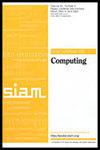A Structural Theorem for Local Algorithms with Applications to Coding, Testing, and Verification
IF 1.6
3区 计算机科学
Q3 COMPUTER SCIENCE, THEORY & METHODS
引用次数: 0
Abstract
SIAM Journal on Computing, Volume 52, Issue 6, Page 1413-1463, December 2023.Abstract. We prove a general structural theorem for a wide family of local algorithms, which includes property testers, local decoders, and probabilistically checkable proofs of proximity. Namely, we show that the structure of every algorithm that makes [math] adaptive queries and satisfies a natural robustness condition admits a sample-based algorithm with [math] sample complexity, following the definition of Goldreich and Ron [ACM Trans. Comput. Theory, 8 (2016), 7]. We prove that this transformation is nearly optimal. Our theorem also admits a scheme for constructing privacy-preserving local algorithms. Using the unified view that our structural theorem provides, we obtain results regarding various types of local algorithms, including the following. We strengthen the state-of-the-art lower bound for relaxed locally decodable codes, obtaining an exponential improvement on the dependency in query complexity; this resolves an open problem raised by Gur and Lachish [SIAM J. Comput., 50 (2021), pp. 788–813]. We show that any (constant-query) testable property admits a sample-based tester with sublinear sample complexity; this resolves a problem left open in a work of Fischer, Lachish, and Vasudev [Proceedings of the 56th Annual Symposium on Foundations of Computer Science, IEEE, 2015, pp. 1163–1182], bypassing an exponential blowup caused by previous techniques in the case of adaptive testers. We prove that the known separation between proofs of proximity and testers is essentially maximal; this resolves a problem left open by Gur and Rothblum [Proceedings of the 8th Innovations in Theoretical Computer Science Conference, 2017, pp. 39:1–39:43; Comput. Complexity, 27 (2018), pp. 99–207] regarding sublinear-time delegation of computation. Our techniques strongly rely on relaxed sunflower lemmas and the Hajnal–Szemerédi theorem.
局部算法的结构定理及其在编码、测试和验证中的应用
SIAM 计算期刊》,第 52 卷第 6 期,第 1413-1463 页,2023 年 12 月。 摘要。我们证明了一系列局部算法的一般结构定理,这些算法包括属性测试器、局部解码器和可概率检查的邻近性证明。也就是说,我们证明了,按照 Goldreich 和 Ron [ACM Trans. Comput. Theory, 8 (2016), 7] 的定义,每个进行 [math] 自适应查询并满足一个自然鲁棒性条件的算法的结构都承认一个具有 [math] 样本复杂度的基于样本的算法。我们证明这种变换几乎是最优的。我们的定理还提出了一种构建隐私保护局部算法的方案。利用我们的结构定理所提供的统一观点,我们获得了有关各种局部算法的结果,包括以下结果。我们加强了松弛局部可解码代码的最新下限,在查询复杂性的依赖性上获得了指数级的改进;这解决了 Gur 和 Lachish [SIAM J. Comput., 50 (2021), pp.]我们证明了任何(恒定查询)可测试属性都允许具有亚线性采样复杂度的基于采样的测试器;这解决了 Fischer、Lachish 和 Vasudev [第 56 届计算机科学基础年度研讨会论文集,IEEE,2015,第 1163-1182 页] 著作中的一个未决问题,绕过了以前的技术在自适应测试器中引起的指数级爆炸。我们证明了近似性证明和测试器之间的已知分离本质上是最大的;这解决了 Gur 和 Rothblum [Proceedings of the 8th Innovations in Theoretical Computer Science Conference, 2017, pp.复杂性》,27 (2018),第 99-207 页]关于计算的亚线性时间委托的问题。我们的技术在很大程度上依赖于松弛向日葵定理和 Hajnal-Szemerédi 定理。
本文章由计算机程序翻译,如有差异,请以英文原文为准。
求助全文
约1分钟内获得全文
求助全文
来源期刊

SIAM Journal on Computing
工程技术-计算机:理论方法
CiteScore
4.60
自引率
0.00%
发文量
68
审稿时长
6-12 weeks
期刊介绍:
The SIAM Journal on Computing aims to provide coverage of the most significant work going on in the mathematical and formal aspects of computer science and nonnumerical computing. Submissions must be clearly written and make a significant technical contribution. Topics include but are not limited to analysis and design of algorithms, algorithmic game theory, data structures, computational complexity, computational algebra, computational aspects of combinatorics and graph theory, computational biology, computational geometry, computational robotics, the mathematical aspects of programming languages, artificial intelligence, computational learning, databases, information retrieval, cryptography, networks, distributed computing, parallel algorithms, and computer architecture.
 求助内容:
求助内容: 应助结果提醒方式:
应助结果提醒方式:


